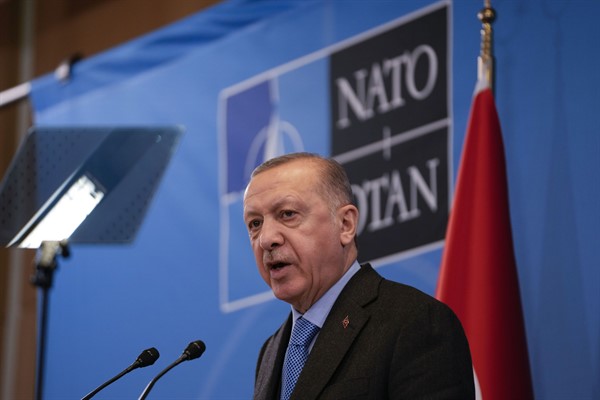Blocking expansion of the alliance could be Turkey’s way of, if not taking revenge, then at least reminding the other NATO allies of its relevance. It might even be used to induce concessions, such as getting Finland to extradite members of the Kurdistan Worker Party, or PKK, residing in the country. Demanding a quid-pro-quo, often called issue-linkage, is a tried-and-true instrument of diplomacy. More than anything, however, the episode underscores Turkey’s complicated relationship—to put it mildly—with the alliance. Democratic values are a pillar of NATO, but Turkey, along with Hungary and Poland, have questionable records in their adherence to those standards. Could Ankara fear that allowing two well-established democracies into the alliance lead to it being further isolated? That doesn’t seem likely, as Turkey’s long history as one of the alliance’s weaker democracies has never been an issue before. The truth is that Turkey didn’t become a member because of its adherence to democratic values or peaceful relations with its neighbors—it had an ongoing and sometimes violent rivalry with Greece. It gained entry in 1952 because of its strategic geographic location—not in the North Atlantic, but on the then-Soviet Union’s southern flank—and valuable troop contributions during the Korean War. Military prowess and strategic value brought Turkey into the alliance, and they explain why it remains a crucial NATO member today. Turkey also has a complex and, for its NATO allies, problematic relationship with Russia. If it is not exactly playing both sides, Ankara is trying to not clearly pick one side over the other. Turkey has sought in recent years to improve its relations with Moscow, historically a rival, going so far as to purchase the Russian-made S400 air defense system over Washington’s objections. This was just one of a host of measures that the two countries have been pursuing to deepen their military and economic ties. It also seems that Turkish President Recep Tayyip Erdogan shares Putin’s desire to reestablish a sphere of influence for his country—and perhaps even Turkey’s Ottoman-era imperial grandeur. At the same time, Turkey has played a highly constructive role in the Western coalition’s effort to oppose Russia’s invasion of Ukraine. Though it has not joined in imposing economic sanctions against Moscow, it has taken steps to block Russian warships’ access to the Black Sea and continued to supply weapons to Ukraine. Turkey also hosted peace talks in March, reflecting its strong relationship with both Ukraine and Russia. Turkey may sense that blocking Finland or Sweden from acceding to NATO, or at least vocally raising concerns about their eventual membership, will help smooth over relations with Russia in the near future. In other words, Turkey’s foreign policy is reflective of its geography: Straddling East and West makes for a tricky balance. In the end, however, Turkey’s position is likely all about signaling. By expressing reservations and even threatening to stop the accession of Finland and Sweden into the alliance, Ankara is simultaneously signaling its importance to the alliance, and the need for its NATO allies to continue to respect it as a valuable ally, while signaling to Russia that Turkey, unlike the other members of NATO, is a country that can be reasonably sympathetic toward Moscow’s concerns. Ultimately, these kinds of arguments are a common feature of alliance formation or, in this case, alliance expansion. Previous NATO accession processes took years, as candidates languished in what the alliance calls a Membership Action Plan, during which they improved their military and political institutions to meet NATO standards. Finland and Sweden skipped that step, ostensibly because they already meet those standards. Assuming Turkey’s demands delay but do not derail the current process, they will still join in record time.More than anything, however, Ankara’s threat to block Finland’s and Sweden’s NATO accession underscores Turkey’s complicated relationship—to put it mildly—with the alliance.
Paul Poast is an associate professor in the Department of Political Science at the University of Chicago and a nonresident fellow at the Chicago Council on Global Affairs.

